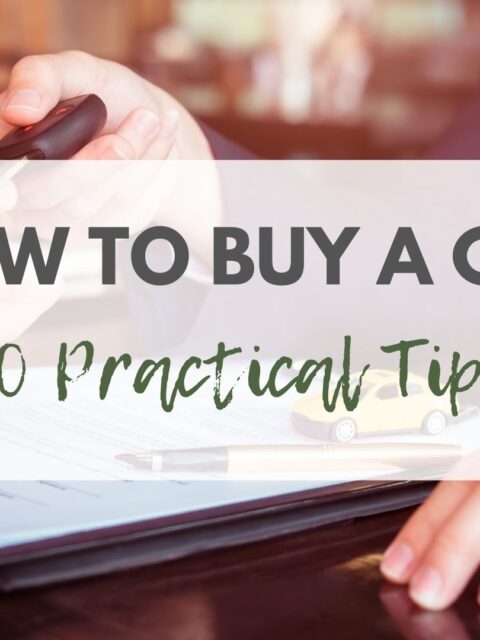
These 13 financial tips for college graduates will set you up for success if you follow at least one or two things on the list.
The last four, or five years are finally over! You’re smiling ear to ear to be done with school and ready to get on with your life. No more assignments and drinking coffee to stay up all night to read for an exam. I know that feeling of relief! Congratulations on your achievement; now unto the next stage.
If you’re just graduating college, you have insane opportunities and advantages when it comes to money. One of the most important things is TIME. Time to explore your ideas, go after your dreams, make more money, or travel around the world. It is also very crucial not to waste the time given.
Coming from someone who graduated last year, I have a few crucial financial tips to help prepare you for your financial journey.
1. Save at least 20%-25% of your income
You’re finally making good money and that paycheck is looking nice and you’re thinking you should spend it all on things you care about. STOP RIGHT THERE! Instead, aim to save at least 20-25%, then blow the rest on whatever you want. This way, you can spend guilt-free without worrying you didn’t save before spending.
Getting into the habit of saving first or paying yourself first sets you up on the path of breaking the cycle of living paycheck to paycheck and building wealth. Your future self will thank you and you will NEVER regret saving.
Where should you save this money? Put it in a high-yield savings account to earn a higher interest rate than the traditional savings account. The savings can be for your emergency fund (3-6 months worth of expenses) and sinking fund (using the money for an upcoming or planned expense)
Related Content:
- How To Properly Manage Your Money
- Check out the high-yield savings accounts I use for my emergency and sinking funds. Scroll to Savings Apps.
2. Start investing
Start investing even if you have student loans. Yes, you read it right! A lot of people are too scared to start investing or they think they have to fully pay off their debt before they can invest. You can pay off debt and still invest.
Time is the biggest investing advantage of all – make hella good use of it! As young adults, this is your prime time to start building wealth. Don’t wait to start making more money because time will fly by and when you start investing at 30, you’ll need to play “catch-up” to recover the years lost. I wish I had started investing at 18, but it’s never too late to start. Just start and let your money work for you.
Remember: Time is your greatest wealth-building tool!
Related Content:
- Read How to Start Investing in Stocks With No Experience
- 5 Reasons to Start Investing Early
- Visit the recommendations page for money accounts I use
- 10 Things You Need To Do Before You Start Investing
3. Figure out your budget
I hated the idea of budgeting because it felt so restrictive and when I created one, I would always go over it and didn’t see the point. So I switched it up and made it more flexible. I included “fun money” into my budget – for example, travel, make-up, facials, and getting my nails done. I think it’s very important to spend money on the things you enjoy.
A budget tells your money where to go instead of wondering where it went. What works best for me is using an Excel workbook and budgeting apps to track my expenses. My budgeting method is a zero-based technique, meaning every dollar has a job. Essentially, my income minus expenses equals zero.
- Check out The 5 Best Budgeting Apps
4. Contribute to 401k plan up to match and more
A 401(k) is a retirement savings plan offered by an employer to its employees. If your company has a 401(k), make sure to take advantage of it because you are contributing pre-tax dollars into the account, which reduces your taxable income.
Sometimes, companies offer a match: if you contribute a certain percentage, they will match that percentage up to a certain amount. For example, if a company says: “If you contribute 2% of your paycheck into your 401(k), we will also contribute 2%.” Do you know what that means?? FREE MONEY! You get a 100% return on your investment.
If they don’t offer a match, still contribute to reduce taxes on your salary. The limit you can contribute for 2024 is $23,000 for single individuals.
5. Get HSA if eligible
A Health Savings Account is a tax-advantaged medical savings account only available to people enrolled in a High Deductible Health Plan (HDHP). This account allows you to save pre-tax dollars for future qualified medical expenses. Again, when you contribute to an HSA, you reduce your taxable income, just like with a 401(k).
You can open an account by yourself or through your employer. If you do it through your employer, your contributions come from your paycheck and sometimes your employer also contributes to the account.
Not only can you save, but you can also invest your HSA to grow your money, and guess what? it grows tax-free because you contributed tax-free money. The funds don’t expire which is awesome!
HSAs have triple tax benefits:
- You can contribute tax-free money to your account
- The growth from your savings and investment is tax-free
- Withdrawals for qualified medical expenses are tax-free*
*It will be taxed if used for non-medical expenses
Tip: Since the funds never expire, save all your medical receipts and reimburse yourself at a later date to allow your money to grow.
6. Set up a Roth IRA
A Roth IRA (Individual Retirement Account) is another retirement savings account, but it is opened by an individual, not employer-sponsored. The beauty of a Roth IRA is that you contribute after-tax money, invest it and your investments grow tax-free since you already paid taxes up-front.
You might ask why contribute to a Roth IRA if you’re already contributing to a 401(k). With a 401(k), you are contributing pre-tax money to lower your taxable income and get a company match (a.k.a free money). With a Roth IRA, you won’t have to pay taxes upon withdrawal and you can withdraw your contributions anytime tax-free and penalty-free.
7. Start building your credit if you haven’t
If you don’t have a credit card, get one right now!! Okay let’s slow down, don’t rush to get just any credit card. Do your research and see which is best for you.
Building your credit lets lenders see how good you are with borrowing money. Having a great credit report and score gives you access to amazing interest rates for car loans, mortgages, personal loans, etc. because you have demonstrated how good of a borrower you are.
The rule of thumb is to always pay off your balance before the due date, don’t use more than 30% of your credit limit, don’t spend money you don’t have, and don’t open too many accounts or close your accounts unless you have to.
Related Content:
8. Keep learning new skills
Just because you’re done with college doesn’t mean you should stop learning and growing. Invest in yourself and keep adding value where needed. There are many resources online for free, take advantage of them and put them to use.
You don’t have to go back to school to learn a skill to get a job. Self-education is paramount to help take you to the next level. Take risks and opportunities thrown at you because that is where the most growth is. Experience is truly the best teacher.
9. Pay off high-interest debt
Don’t wait and make excuses not to pay off your debt. If you have student loans or credit card debt, make a plan to pay them off as soon as possible. High-interest debt slows down your wealth-building journey.
If you have debt and don’t know how or where to start list all your debt. Decide if you want to start with the lowest balance first or lowest interest or highest balance or highest interest rate. I say go with the debt that is the biggest concern for you; in the end, it all depends on your financial situation. This piece on MoneyUnder30 shows a technique to help you decide which is the best method to use.
If you have a plan in place to pay off your debt, then you’re definitely on the right track! Don’t give up and make sure to celebrate your small wins.
10. Live below your means
As humans, our wants will always surpass our needs. I think it’s very important to take note of our needs vs wants. Don’t try to keep up with the Joneses. Keeping up with the Joneses means you’re trying to compete with your neighbors (friends). For example, if they buy the latest car, you also buy the latest car. How about you mind your lane and do what’s best for you?
11. Diversify income streams
I think we can all agree that 2020 has shown us that anything can happen and we need to be prepared. Having multiple streams of income allows you to make more money and diversify your risk, so if you lose one income stream, you can rely on others.
Use your 20s to build your legacy.
- Related content: 25 Ways to Make Extra Money in College
12. Buy a used car
Buying a brand-new car isn’t worth it. Hear me out: as soon as you drive it off the lot, 9-11% of its value is gone (your money has gone with it too). Now, I am not saying buy a horrible car or don’t buy your dream car. My point is to do extensive research and weigh the opportunity cost.
Also, think about these questions: how long do you plan to keep it for, what’s the maintenance going to be like, what’s the gas usage, are you buying in cash or financing? If you are financing, is your credit good enough to get interest rates, and how long are you financing for, what type of insurance, is there still a warranty, etc?
A car is a depreciating asset so a lot goes into buying a new car just because you feel like it. As a quick rule of thumb, a car will lose between 15% and 20% of its value each year according to Bankrate.com.
13. Work hard, play hard
Lastly, while I’m a big advocate for hustling hard and investing, make sure you have fun too. It’s so easy to get caught up in the chase and get burned out quickly.
If you find yourself getting burned out easily: Take a deep breath, disconnect, do yoga, or meditate and reconnect with yourself. Travel, explore new places and things, take care of your health and mental well-being, and build new connections.
I wish you nothing but the best on your journey. Hit me up if you have any questions.
I hope you enjoyed reading this post and learned something new!
Related Content:
- If you want cashback apps when you go grocery shopping or just looking for coupons, check my recommendations page for my referral code
- Read the Best Free Budgeting Apps
- The Best Credit Cards for Beginners
- How to Start Investing in Stocks With No Experience
- How To Properly Manage Your Money
- 5 Reasons to Start Investing Early
- 10 Things You Need To Do Before You Start Investing
Please share your thoughts in the comment section 🙂
If you enjoyed this content, please comment, share, pin, and tweet!


